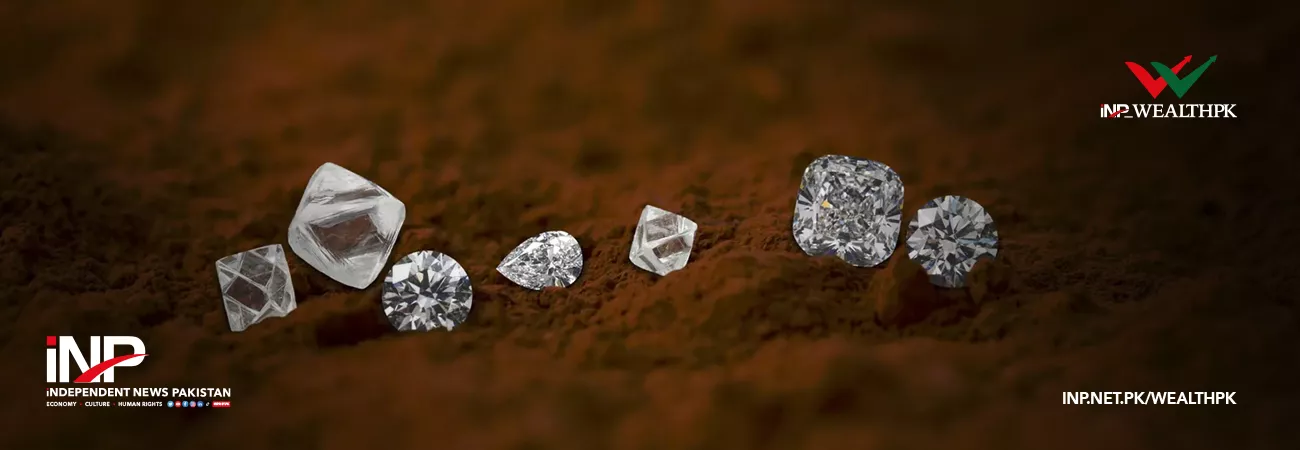INP-WealthPk
Faiza Tehseen
The demand for synthetic gemstones is increasing globally due to their beauty, affordability, durability and optical identity to their natural counterparts. Developed countries in Europe are their significant markets. Owing to the growing consumer appetite, the global synthetic gemstone market is expected to grow at a compound annual growth rate (CAGR) of 4.8 percent by the year 2027, reports WealthPK.

This industry is also flourishing in Pakistan, but unfortunately the country lacks the cutting-edge simulation units to synthesize standard gemstones to grab a sizable share in the international market. In a discussion with WealthPK about synthesized gemstones, Assistant Director of Geological Survey of Pakistan Yasir Shaheen Khalil said, “To make a synthetic gemstone, a required proportion of elements present in a natural gemstone are fused together at particular temperature, pressure and controlled conditions”.
The most common methods of synthetic gemstone production include the Verneuil process (flame-fusion/melt process), Czochralski (crystal pulling/melt process), Hydrothermal growth (solution process), and flux growth (solution process). Continuing the discussion, Yasir said synthetic gemstones have all the chemical, optical, and physical characteristics of their natural counterparts. In synthesized gemstones, the desired colour, hue, size, and other value-added properties may also be introduced. There may be a slight difference between the two in terms of fluid inclusions, only found in natural ones. To prevent such confusion, there are strict guidelines to market and sell the imitated ones.
“As the synthetic gemstones industry is flourishing, Pakistan must focus on adopting the latest technology to compete in the international market. This will help us generate sizable revenue and economic uplift as well”. Talking about the industrial manufacture of lab-generated gemstones, research associate in charge of gemmology laboratory at the University of Peshawar, Shakirullah Orakzai said, “Whatever the world can produce, it can also be produced in Pakistan. The only thing is to understand the need and arrangement for a proper production unit. Our gemmology laboratories can produce the best quality through smart upgradation, and it must be done for Pakistan’s better economic growth”.
Talking about the production of synthetic gemstones in Pakistan, Project Director of Mineral Resource Mapping Balochistan (MRMB) from Mines and Minerals Development Department Syed Muzaffar Ali Bokhari said, “Synthetic gemstones manufacturing is a new segment in the gemstones industry in Pakistan. If qualitative products matching real characteristics, chemistry, and physical appearance are produced under strictly controlled measures, Pakistan can be one of the top standard providers.”
“Though the country’s real gemstone industry has not fallen behind, it is yet to be fully exploited. Pakistan can capture the market in both segments – real and synthetic. There is no lack of talent or expertise in our geoscientists. To add more quality, expertise can be exchanged with other countries including China. But there exist many hurdles, such as heavy customs duties to import the required material and equipment, high prices of energy units, and costly fuel. All these hurdles must be cleared to allow every industry in the country to flourish,’’ he said.

In a discussion with WealthPK about the importance and need for gemstone synthesizing and treatment units, gemmologist and miner Zakir Ullah alias Jhulay Lal said, “As a gemstones trader, I always feel that Pakistan is far behind in modern lapidary, gemstones treatment and synthesizing. Although it is a sensitive matter to market the synthetic and treated gems in the market, it is possible that some mal-practitioners may sell them as the real ones, so there must be a law to define the product clearly with a proper tag showing if it is natural, synthetic, or treated. Such law-making will not only help the buyer, but also open a new window of opportunity in this industry.”
Zakir is the executive member and former president of All Pakistan Commercial Exporters Association of rough unpolished, precious & semi-precious stones (APCEA) and one of the top exporters of gemstones. He said there is an increasing need to establish gem treatment and synthesizing units and certified labs in the country. Zakir said he had to send stones to Italy if he needed any type of treatment which caused a lot of expenses.
“Synthetic gemstones are comparatively cheaper to buy for all than the real ones. So, there is a lot of room for the local buyers to buy and to export as well. The focus must be on inviting foreign companies to the country under flexible conditions. The gemstone industry can generate sizable employment opportunities and income but the only need is that it must gain attention from the official level”.
Credit: Independent News Pakistan-WealthPk




